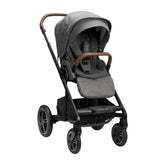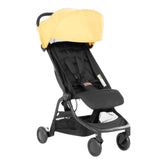Baby Blues? Signs of Postpartum Depression & How To Get Help

Becoming a new parent is a dream come true for many parents. However, between the late-night feedings and diaper changes, some new parents find themselves overwhelmed by unexpected feelings of sadness, anxiety, or disconnection. These emotions are often brushed off as the "baby blues," but for many, they signify something deeper: postpartum depression (PPD).
If you're struggling with postpartum depression, you're not alone. Roughly 1 in 7 women experience PPD, and it's crucial to understand that help is available. Let's take a closer look at the signs of postpartum depression, ways to overcome it, and where to seek support.
What Is Postpartum Depression?
Postpartum depression is a type of depression that occurs after childbirth. While it is common for new mothers to feel exhausted or anxious due to the demands of a newborn, PPD is more severe and long-lasting. It's not a weakness or a character flaw but a complex condition influenced by physical, emotional, and hormonal changes after childbirth.
Common Symptoms of Postpartum Depression
Symptoms of PPD can vary, but the following are some of the most common:
- Persistent sadness or low mood
- Severe fatigue or lack of energy
- Feelings of guilt, hopelessness, or worthlessness
- Difficulty bonding with the baby
- Anxiety or panic attacks
- Irritability or anger
- Changes in appetite or sleep patterns
- Thoughts of harming yourself or the baby
If you are having thoughts of hurting yourself or your infant, you should call 911 immediately and seek emergency help or call the National Suicide Prevention Lifeline at 988.
If you're experiencing any of these symptoms, it's important to reach out for help. Recognizing postpartum depression is the first step toward healing.

Overcome Postpartum Depression: Taking the First Step Toward Recovery
Recovering from postpartum depression takes time, but it's essential to know that treatment is effective. The sooner you acknowledge your symptoms and seek help, the sooner you can regain your emotional well-being. There are several steps you can take to begin to heal from and overcome postpartum depression:
- Speak with a healthcare professional. Your doctor or a mental health specialist can evaluate your symptoms and recommend treatment options such as therapy, medication, or a combination of both. Research show that therapy, especially cognitive-behavioral therapy (CBT), is particularly effective in treating postpartum depression.
- Lean on your support network. Reaching out to friends, family, or your partner can make a significant difference. Be open about how you're feeling and allow them to help with baby care or household tasks.
- Prioritize self-care. Taking care of yourself is essential. Even small acts like showering, resting when the baby naps, or taking a short walk can lift your spirits.
- Consider joining an online support group. Isolation can exacerbate feelings of loneliness, but connecting with others who understand your experience can be healing.
Find Comfort in an Online Support Group Membership
For many new mothers, connecting with others who have faced similar challenges can provide significant relief. Online support groups offer flexibility for busy parents who may not have time to attend in-person sessions. By joining a postpartum depression support group, you'll find:
- A community that listens. You'll be surrounded by people who understand your struggles and can offer emotional support.
- Access to resources. Support groups often share helpful materials and coping strategies to manage PPD.
- A safe space. These groups provide a confidential environment to discuss your feelings without fear of judgment.
If you're looking for a postpartum depression workbook or practical tools to help you track your progress and understand your emotions, some groups and professionals offer these resources as part of their services. You can find comfort in an online support group membership, where parents share their stories, resources, and encouragement in a safe, non-judgmental space. Postpartum Support International offers multiple support resources, an online provider directory, and a direct helpline at 1-800-944-4773.

Postpartum Depression Workbook: A Helpful Tool for Healing
A postpartum depression workbook can be a powerful tool for understanding and managing your condition. These workbooks often include exercises, journaling prompts, and coping strategies designed to help you process your emotions and track your recovery. Some helpful elements in a postpartum depression workbook may include:
- Identifying Triggers. Recognizing what situations or thoughts worsen your depression can help you address them more effectively.
- Tracking Your Mood. Documenting your emotional highs and lows can help you notice patterns and share useful information with your therapist.
- Building a Self-Care Routine. Workbooks often guide you in developing habits that promote mental health, such as sleep hygiene, physical activity, and mindfulness practices.
Encouraging Partners to Help: Supporting New Moms Through Postpartum Depression
Partners need to understand the emotional toll postpartum depression can take and how they can offer support. Encouraging communication, helping with baby care, and making sure the mother feels loved and appreciated can help ease the burden.
Finding Professional Help for Postpartum Depression
While self-care and support from loved ones are essential, professional treatment is often necessary to fully overcome postpartum depression. If you or someone you know is experiencing symptoms of PPD, consider these options for help:
- Speak with a healthcare provider. A doctor can recommend treatment options, whether it's medication, therapy, or a combination.
- Consider therapy. According to the Mayo Clinic, cognitive-behavioral therapy (CBT) is a common and effective form of talk therapy for postpartum depression. It can help you identify negative thought patterns and develop healthier ways of thinking.
- Join a support group. There are many in-person and online support groups specifically for postpartum depression. These groups can offer emotional support, resources, and guidance during your recovery.

Taking the Next Step: Caring for Yourself and Your Baby
Parenthood is a beautiful and transformative experience, but it also comes with challenges. Recognizing postpartum depression and seeking help is not only an act of self-care but also a way to ensure that you can be the best parent possible for your child. If you're experiencing postpartum depression, don't wait to seek help. Whether it's talking to a healthcare professional, joining an online support group, or utilizing a postpartum depression workbook, there are resources available to help you recover.
Support Is Available—You're Not Alone
Navigating the ups and downs of new parenthood can be difficult, but you don't have to do it alone. If you're struggling with postpartum depression, it's okay to ask for help. Reach out to a healthcare provider, lean on your support system, and consider joining a postpartum support group to find comfort and encouragement.
At ANB Baby, we're committed to making life easier for new parents by offering a wide range of products that simplify your daily routine. From baby supplies to self-care essentials, we're here to support you as you navigate this journey. Visit our online store to find everything you need to care for both your baby and yourself.









